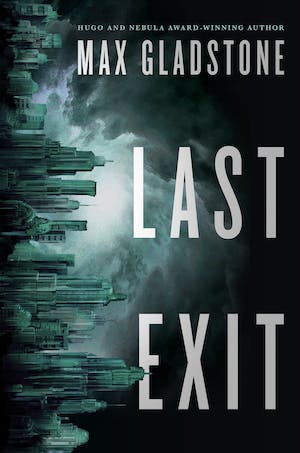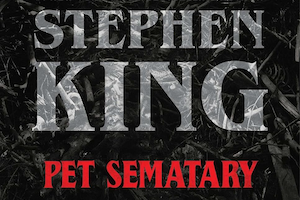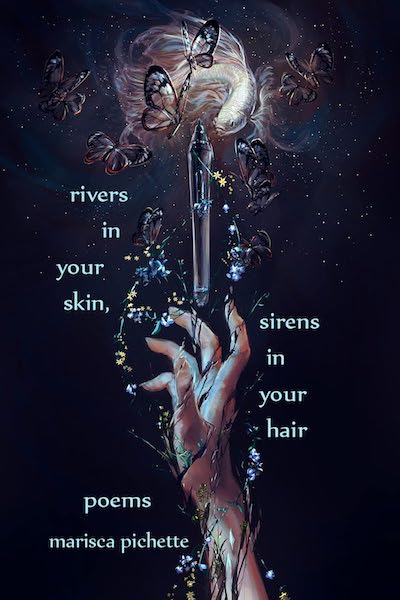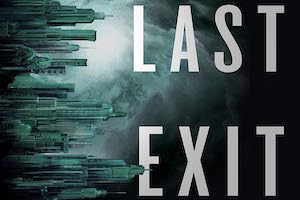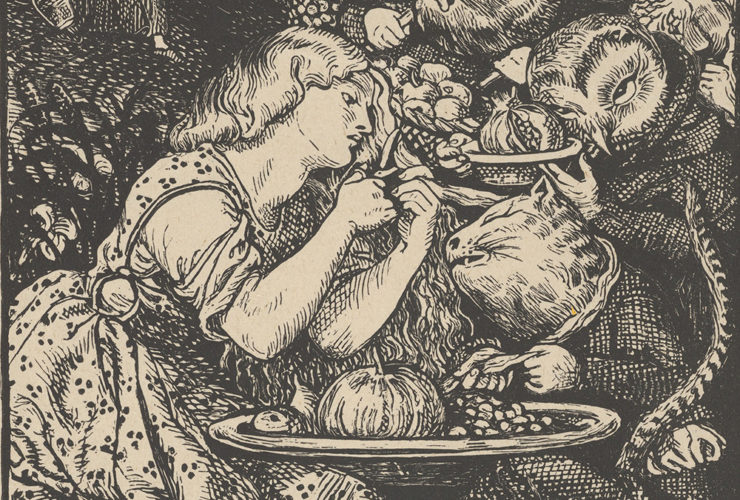Welcome back to Reading the Weird, in which we get girl cooties all over weird fiction, cosmic horror, and Lovecraftiana—from its historical roots through its most recent branches.
This week, we continue Max Gladstone’s Last Exit with Chapters 11-12. The novel was first published in 2022. Spoilers ahead!
Summary
“I got one thing from those demon books,” Sean said. “I learned how demons talk.”
After escaping from the roadhouse, cowboy in pursuit, Ramon and Ish flee through alts, trying to lose him. At one stop, post-apocalyptic Neo-Confederates assault them wearing white hats. Finally, battered and aflame, the Challenger slides into the motel parking lot. Sarah pulls Ramon out, as she did ten years before; less enthusiastically she extricates Ish, who has an arrow through his shoulder. There’s evidently some bad blood between these two.
June grabs fire extinguishers, and she and Sarah douse the car. The cowboy begins to manifest, boot heels clicking. Sarah and June join hands to deny him access, but it takes Zelda linking into the chain to repel him.
Sean, the kid from the front desk, wants to call the police. Sarah persuades him to let her handle the situation, to help instead by fetching linens. As she prepares to extract the arrow, Ish tries to apologize for—something. Sarah cuts him short.
The gang convenes in a conference room. Zelda refrains from gushing her relief that they’ve come. They debate whether the cowboy is Sal’s avatar or a separate enemy. Rot doesn’t usually attack through tech. Ish notes that the internet has “its own uncertainty,” but June insists the cowboy isn’t Sal. Either way, they need to outrun both. Zelda says they have to find the crossroads, where spin concentrates and the world can be changed. They couldn’t get there before, Ramon says. Does Zelda think this time will be different, just because “it has to be”? Yes, Zelda replies. “Because it has to be.”
Sean announces that someone’s on the front desk phone for them. Zelda, Sarah and June go down. Outside the lobby doors stands the previously-cowboy-munched park ranger, sporting his own white hat. Though obviously dead, he speaks through the phone (not actually with a phone). The cowboy hasn’t yet mastered how to “have a body. How to be in one place, not in every place.” So he makes helpers. Some have already arrived.
Out in the parking lot, white-hatted people emerge from trucks. The cowboy’s coming, but he offers a deal. If Zelda joins them, the others will be spared. Except for June. The cowboy needs her, too. Zelda declines, and the ranger drops lifeless. Sean again wants to call the police. Sarah points out that the sheriff’s car is already there, and June knocks the phone from Sean’s hand. It rings: Unknown number. Then every phone in the motel starts ringing.
Upstairs, the cacophony rouses Ramon and Ish. The television displays the cowboy emerging from blue-static fog. The two battle through white-hats to join the others. Zelda hatches a desperate plan to “hitch” into another alt—never mind that it didn’t work when they tried it before.
They race roofward. Storm clouds gather above, good. White hats surround the building, bad. The alt-riders link hands and gather spin. Sarah asks Sean to come with them, but he’s determined to save the white-hats, many people he knows. If nothing else, it’ll buy the riders time.
Sean steps into the stairwell and locks the door behind him. He tries to break off the key, as he’s seen heroes do in movies, the kind of heroes he writes about in his own stories. Footsteps ascend the stairs, revealing his brother Earl. Early looks like himself except for the white hat. Earl warns Sean away from this fight: his whole life’s ahead of him. The people he’s defending are criminals. The cowboy’s told Earl how they’ll admit the thing that howls out in the dark, to eat the world whole. The cowboy wants to stop this catastrophe.
Sean finally breaks off the key. Earl grabs him. Other white-hats line the stairwell, parting to allow the cowboy himself to climb. He lifts his hat-brim to reveal his face.
Into which Sean spits.
Back on the rooftop, the storm breaks and lightning flashes. Hold tight, Zelda tells the others. If they’re separated, head toward the Medicine Wheel. Thunder growls. A voice sounds. Each alt-rider hears a different message, temptations tailored to their vulnerabilities. Meanwhile something pounds the door.
Zelda’s shaken by the voice’s accusations—that she’s weak, that she’s already lost her friends—but spin, the power of what might be, counters it. The clouds shift to form a human face with lightning eyes: Sal. Yet it’s far more awful (“awe-ful”) than she ever was.
Zelda reaches high and calls down lightning. It courses through the building, shorting out the electrical devices that enable the cowboy. The thunder tells Zelda: I missed you. Then, into “a darkness in the heart of light,” the alt-riders slip away.
* * *
The motel catches fire. Unconcerned about the fate of his minions, the cowboy emerges from the burst-open rooftop door. As he looks to the sky, his hand falls to his holster, but the cloud-face has vanished. He tips his hat to the storm, then steps off the edge of the roof and is gone.
This Week’s Metrics
Against the Rot: It’s Climate Solutions Week at NPR; I’ve just started to dive into the articles.
What’s Cyclopean: Zelda’s lightning looks “like jellyfish, it schooled and danced, and in those flashes, the clouds were iridescent green, purple, blue, were bloody red and all the colors of a coral reef. …The lights bared pieces of the clouds’ holy anatomy, God performing the dance of veils…”
The Degenerate Dutch: Sarah points out that the world’s been ending for a long time. “Ask anyone who was living here before white folks. There used to be so many people in this country that when most of them died, their escaped livestock became those million-head buffalo herds people tell stories about.”
Weirdbuilding: Zelda tells off the cowboy and “all his squamous buddies.”
Libronomicon: Ramon and Ish riff on Lord of the Flies, joking about using a pig’s head or a conch shell to determine who gets to speak in the planning meeting. Seems like a bad omen. But it’s not the team turning on each other today, it’s the local community, Sean’s neighbors making sure that his horror novel Fear will never get finished.
Anne’s Commentary
Whenever I see an impeccably restored vintage car cruising down the mean streets all other vehicles use, I wonder what its driver can be thinking. Whether luxury sedan or Depression-era truck or muscle car, these rides are always preternaturally shiny, without the tiniest scratch on glass or dimple in bumper. Even their inner workings are cleaner than your average operating room. How could anyone dream of exposing such labor-intensive perfection to potholes, pigeons, atmospheric grime, stray nails and tractor-trailers and tail-gaters?
Yet here’s Ramon, once again driving that Challenger into the post-apocalypse hellscapes of the alts. Sure enough, it lands in Montana banged-up and on fire. That’s got to be heart-breaking for Ramon, even if the Challenger is a magical telepathic car with as many lives as Stephen King’s Christine.
None of Zelda’s classmates has had a pleasant journey to their ten-year reunion. At their first official get-together, she shares her ideal vision for the event: Fourth of July and fireworks, all of them lounging on a lawn and talking into the night while music drifts over from another blessedly mundane celebration, with not one selection from the Incomplete Works of Erich Zann to harshen the mood.
That Zelda could come up with that idyllic scenario proves her amazingly resilient capacity to hope. Better than the others, she knows it will be a pending catastrophe that reunites them. She’s the one who’s stayed on the alt-roads, while the others have made lives and families and whole “normal” worlds for themselves. They could’ve ignored her call and preserved their hard-won safe places a little longer. June, too, or June especially—hers was an essential ignorance of the Enemy. June didn’t have to step onto dark paths, or the others return to them.
Maybe they had no other choice, because in spite of the infinite possibilities inherent in an uncertain cosmos, there are some inevitabilities, certainties, destinies. Zelda worried that her friends might ignore her summons, but that’s self-doubting Zelda all over. The alt-riders are on a mission from—whom? Probably none would feel comfortable saying their orders come from God, though Ish thinks of the Enemy as a great serpent, a form God’s opposite traditionally takes. Ramon and Zelda fall back on the simplest language to define their way forward. What makes Zelda think that this time they’ll reach the crossroads? Ramon supplies the answer, which she affirms: This time will be different because it has to be. They will go to the crossroads. They will stop the rot. They will save the world. That short word will is long in meaning. Without qualifiers, it implies certainty. Will also expresses desire and determination. As a noun, it’s the mental faculty that drives us to pursue and achieve goals. As a verb, it’s the exercise of that faculty: I will the world to change, Zelda’s pet determination.
If we equate will with wish, then willing something won’t necessarily make it so; combined with action, however, it increases the probability of achievement. Get enough power into your will, or combined wills, enough spin, and you can make miracles happen. Magic.
First you need the right team. Looking around the circle of her friends, Zelda realizes that for all the surface changes, they’re the same people she met at Yale. Was their coming together the random result of roommate pairings and parties attended? Zelda doubts it. They fit together so well, meshing like fine-cut gears. “There was a clockwork fit to them,” she thinks, recalling the deist analogy of creation by a Divine Horologist, who sets the intricate device in motion, then leaves it to function on its own. She goes so far as to imagine that if she could turn fast enough, she might “glimpse the clockmaker’s retreating hand.”
Problem: Clocks can be damaged. Rot can hollow out the world. Rot can clog gears, setting off an amplifying chain of failures. Rot can exploit innate weaknesses in the components, for can even God fashion a perfect creation? Would God want to? Might it not be more amusing to see whether flaws can foster strengths? Fun with paradoxes! The Enemy’s voice tries to convince Sarah that her friends will leave, the world is doomed, and she should fly away home. Instead, love of family makes her stay; the only way she can protect her kids beyond a few meals is to —oh hell, save the world. The voice tells Ramon he’s a quitter. For him, it’s the memory of Gabe that defeats the impulse to run. Ish is tempted to join the master program that knows him from the inside, as Ish has been trying to know the whole world via his digital networks. But Ish has also constructed an avatar for the Enemy whose blandishments he can resist. It’s the serpent, the serpent that gnaws away the roots of the world.
To Zelda, the voice whispers that she’s “a bear trap wearing person clothes,” the reason for all their troubles; what’s more, her friends were never really hers, and that goes for Sal, too. She’s saved by the spin she and her fellow alt-riders channel, and by a superlatively beautiful cloud-manifestation of Sal herself, “haloed in spider legs and black lightning”.
Significantly, the cowboy looks toward the Sal-face clouds and reaches for his holster. It’s the automatic response of someone confronted by his archnemesis. Sal’s not his ally, then, but is she his rival or his antithesis?
Last words go to Sean, a deathspian of substance and geeky grace.
I’ll miss him.
Ruthanna’s Commentary
This week raises the horrifying question: what if we have two problems? Admittedly I have about six problems, myself, but the gang’s problem(s) put them in perspective.
The rot is a supernatural problem from outside our reality, given room to enter by—or perhaps embodied by—mundane problems inside our reality. Which comes first, apocalyptic machines or the magic that gives them alt-eating power? It’s big and wild and even beautiful if you stare into the abyss from just the right angle. (Possibly the angle in question is “inside the abyss”.) The rot can be held back by certainty, human (as with the collective self-image of New York City) or computerized (as with the surveillance power of Ish’s services). It can be cast out, at least in spots, and every incursion takes a different form. It thrives on human conflict, but doesn’t seem aware of specific human in-groups and outgroups.
The cowboy claims to be different from the rot. He acts different, drawing strength from technology, and not only the social media that “[destabilizes] reality on a personal level.” His attachment to the horrors of our world—America in particular—also seems more direct. The rot doesn’t, as far as we can tell, thrive on the human desire to belong. He does. He notices human boundaries. He’s American, or at least willing to take on that guise. “…you do know that I am here, that I have been here as long as this has been America. I’m realer than any of you, and I ain’t nothing you got rights to cast out.” Yet he’s fighting the rot’s fight for all practical purposes, even as he claims that Zelda et al enable it rather than just acknowledging it.
In the hotel, he has them surrounded. Sean, bystander turned fighter, shares the common desire to have his neighbors and family be victims rather than something worse—to have the real bad guy be other. But neighbors and family are volunteers for the monster, and we all learn quickly to flinch at the sight of a specific color of hat. Boy, that’s an obfuscatory metaphor, no clue what it’s about.
There’s a zombie apocalypse feel to the hotel scene, and a zombie apocalypse feel to any situation in which you discover your loved ones’ brains getting eaten by zombies (conspiracy theories and disinformation). There are alts where the zombies are literal. There are alts, in fact, with every impossible apocalyptic scenario, from zombies to dinosaurs to roving gangs of cannibals. What they all have in common is the lack of any survivors we’d easily describe as human.
One of my favorite non-fiction books is Rebecca Solnit’s A Paradise Built in Hell, which draws on much experience and data to show that humans, actually, handle crises pretty well. In times of disaster, it turns out, we don’t mostly steal each other’s last cans of food and then turn into cannibals. We build communities and help each other out—until authorities undermined by that mutual aid come along and break down those networks, or until things improve enough that we can stick to our familiar in-groups again. It’s not apocalypse that makes us monsters, but chronic stress—everyday fear and hatred with no clear solutions or ways to help, things bad but not quite bad enough that you actually have to band together.
Perhaps that’s the rot’s power: that it changes how easy is it to make people into monsters, and what kind of people turn into what kind of monsters. The rot bridges mundane problems and mythical ones, everyday resistance and heroism, everyday moral failures and monstrosity. June, a knight with shining fire extinguishers, is also the person who argues against calling the cops on zombies—because she notices that the cops are zombies. Sarah tends wounds with first aid and spin, and also reminds Zelda that the world ending is nothing new. Sean, having a bad night at a crappy job, can plot his own horror novel in one moment, try to talk his brother out of zombiedom in another, and spit in the cowboy’s face the next and final.
Levels of reality blur in an eldritch Gish gallop, and perhaps the number of problems doesn’t matter so much as their severity. Eventually, you have to throw the ring into Mount Doom—and you have to walk, getting blisters on your toes, the whole way.
Next week, join us for Tanith Lee’s classic “Nunc Dimittis.” You can find it most easily in Blood: 20 Tales of Vampire Horror.










